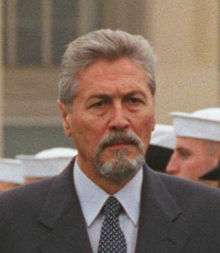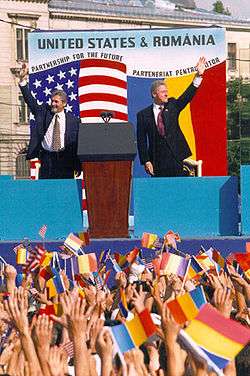Emil Constantinescu
Emil Constantinescu (Romanian pronunciation: [eˈmil konstantiˈnesku] (![]()
Emil Constantinescu | |
|---|---|
 | |
| 3rd President of Romania | |
| In office 29 November 1996 – 20 December 2000 | |
| Prime Minister | Victor Ciorbea Gavril Dejeu (Acting) Radu Vasile Alexandru Athanasiu (Acting) Mugur Isărescu |
| Preceded by | Ion Iliescu |
| Succeeded by | Ion Iliescu |
| Leader of the Romanian Democratic Convention | |
| In office November 1992 – 29 November 1996 | |
| Preceded by | Corneliu Coposu |
| Personal details | |
| Born | 19 November 1939 Tighina, Kingdom of Romania (present day de jure Moldova, de facto Transnistrian Moldovan Republic) |
| Political party | National Liberal Party (2008–present) |
| Other political affiliations | Romanian Communist Party (1965–1989) Christian Democratic National Peasants' Party (1990–1996) Independent (1996–2000, PNȚCD membership suspended while president) People's Action (2001–2008) |
| Spouse(s) | Nadia Ileana Constantinescu |
| Children | Dragoș Norina Boru |
| Profession | Professor of Geology |
| Signature | |
After the Romanian Revolution of 1989, Constantinescu became a founding member and vice president of the Civic Alliance. He was the acting chairman of the Democratic Romanian Anti-Totalitarian Forum, the first associative structure of the opposition in Romania, which was later transformed into a centre-right political and electoral alliance known as the Romanian Democratic Convention (CDR).[1]
Biography
Early life and education
Professional career
Political career and presidency
In 1992 the CDR, of which the PNȚCD was a member, nominated him as its candidate for President of Romania. He lost the election to then incumbent Ion Iliescu after the second round. In 1996, he competed once again for the presidency as the CDR's candidate and managed to defeat Iliescu in the second round, securing a victory by a margin of roughly 10%. CDR's success in the 1996 general elections marked the first peaceful transition of power in post-1989 Romania. On the day he took office, he suspended his membership in the PNȚCD, as the Constitution precludes a president holding formal membership of a political party during his tenure.
Nonetheless, throughout his four-year term, Constantinescu struggled with the slow implementation of the processes of modernization and privatization, which were bogged down by excessive bureaucracy. After another Mineriad which took place in 1999 and ended with the arrest of Miron Cozma, the remainder of his term suffered a political crisis between the majority parties that, at the time, formed the governing coalition. The country was further damaged by a drought in 2000. At the end of his term, he decided not to run for re-election.
After the presidency

Constantinescu's presidency along with CDR's governing were marred by an economic recession. Despite this, his presidency is now credited with putting an end to the Mineriads, a reform of the banking system, as well as with the attraction of the first major foreign investments in Romania. With dashed expectations of an immediate improvement in daily life, Romanians exhibited strong disillusionment with the major parties and politicians, with the Greater Romania Party gaining the second place in the 2000 elections.[2]
A disenchanted Emil Constantinescu, who lost popularity and had failed to fulfill his reformist agenda announced on 17 July 2000 that he would not run for a second term.[3] He temporarily withdrew from political life at the end of his term in November 2000. Constantinescu's direction in foreign affairs continued however after the comeback of Ion Iliescu in 2000. Eventually, Romania joined NATO in 2004.
The former President returned to the political scene in 2002 as head of the People's Action (Acţiunea Populară) party, which subsequently merged within the National Liberal Party in 2008.[4]
Constantinescu has occasionally criticized the policies of the 2004–2009 president, Traian Băsescu, accusing him of authoritarian tendencies,[5] and supported Crin Antonescu in the first round of the 2009 presidential elections.[6]
Nowadays, he still remains heavily involved in politics through working for many NGOs, both in Romania and internationally. Emil Constantinescu is the current president of the Association of Citizenship Education, of the Romanian Foundation for Democracy[7] and also the founding president of the Institute for Regional Cooperation and Conflict Prevention (INCOR).[8]
A frequent speaker at the Oslo Freedom Forum, in 2010 he presented the OFF with a presidential medal.[9] He is also a member of the international advisory council of the Victims of Communism Memorial Foundation.[10]
Honours and awards
National honours

- Order of the Star of Romania
- Emblema de Onoare a Armatei României ("The Romanian Army's Badge of Honor") – 24 October 2012[11]
Foreign honours










Electoral history
External links
References
- Rafto.no. "Doina Cornea".
- (in Romanian) La zece ani
- (in Romanian) Declarație Emil Constantinescu (iulie 2000)
- (in Romanian) Acțiunea Populară acceptă fuziunea cu PNL (HotNews.ro, March 12, 2008)
- (in Romanian) Emil Constantinescu: Discursurile lui Băsescu sunt asemănătoare celor ale foştilor lideri totalitarişti
- (in Romanian) Emil, apel către intelectuali: Asumaţi-vă eşecul moral şi lepădaţi-vă de răul absolut care este Băsescu!
- Fundația Română pentru Democrație
- "Emil Constantinescu". East West Institute. Retrieved 21 August 2015.
- Oslo Freedom Forum
- Emil Constantinescu | Speakers | Oslo Freedom Forum
- "Iliescu si Constantinescu au primit Emblema de Onoare a Armatei" (in Romanian). Retrieved 24 October 2012.
- Aufstellung aller durch den Bundespräsidenten verliehenen Ehrenzeichen für Verdienste um die Republik Österreich ab 1952 (PDF)
- "Dostluk İlişkilerine Katkının Altın Sembolü: Devlet ve Cumhuriyet Nişanları (Turkish) – The Gold Symbol Contribution of Friendly Relations : State and Republic Orders". Haberler.com. February 2013. Retrieved 25 February 2015.
- "Modtagere af danske dekorationer". kongehuset.dk (in Danish). Retrieved 5 May 2019.
- "State Honours". Slovak-Republic.org. Slovak-Republic.org. Archived from the original on 13 April 2016. Retrieved 2 September 2016.
- "Odluka o odlikovanju Njegove Ekscelencije dr. Emila Constantinescua". Narodne novine (in Croatian). 16 June 2000. Retrieved 10 July 2008.
- "Cidadãos Estrangeiros Agraciados com Ordens Portuguesas". Presidência da República Portuguesa. Retrieved 10 April 2016.
Resultado da busca de "Emil Constantinescu".
Bibliography
- Ion Alexandrescu, Stan Stoica, România după 1989. Mică enciclopedie, Editura Meronia, București, 2005
- Tom Gallagher, Furtul unei națiuni. România de la communism încoace, Editura Humanitas, București, 2004
- Dan Pavel, Iulia Huia, "Nu putem reuși decît împreună." O istorie analitică a Convenției Democratice, 1989–2000, Editura Polirom, Iași, 2003